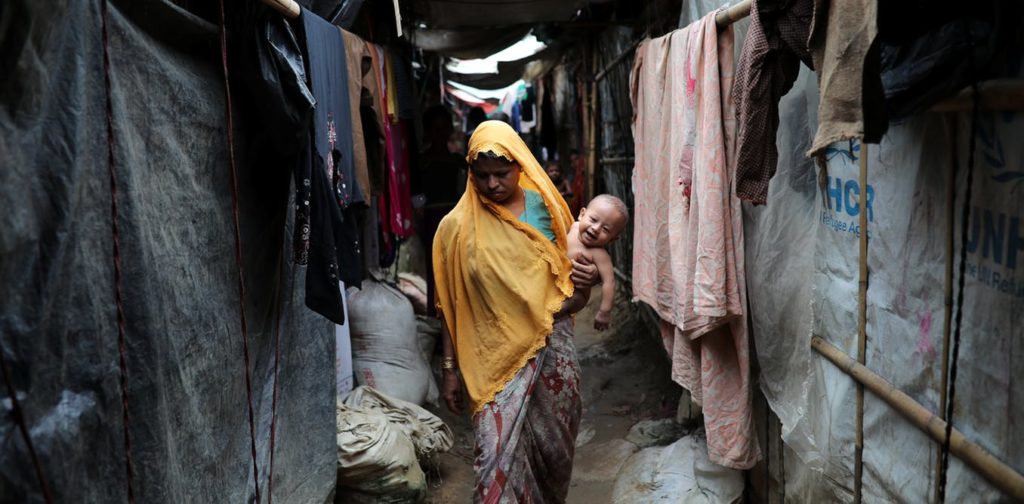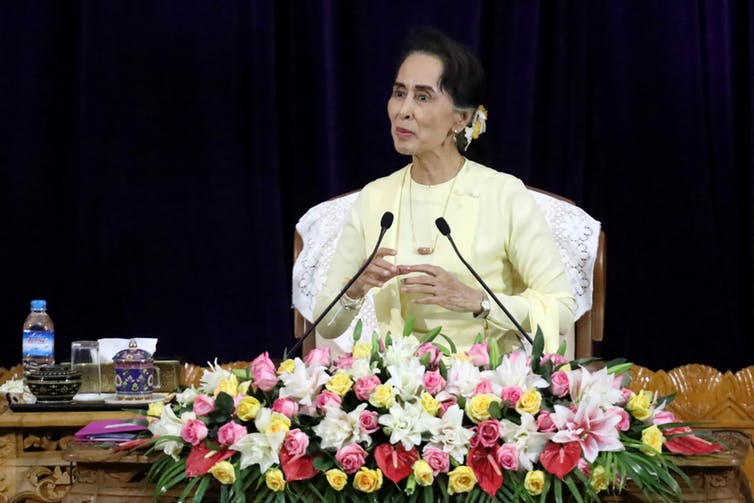UN Report Documents Genocide against Rohingya: What Now?
ASIA-UPDATES ON MYANMAR ROHINGYA GENOCIDE, 10 Sep 2018
Max Pensky and Nadia Rubaii – The Conversation
5 Sep 2018 – The United Nations has released a searing report that details Myanmar’s state violence against an ethnic and religious minority in that country known as the Rohingya.
The report demands that top leadership in Myanmar’s powerful military be held accountable for genocide and other international crimes.
As co-directors of the Institute for Genocide and Mass Atrocity Prevention at Binghamton University, we see this recognition of genocide in Myanmar as an opportunity to help mobilize the international community to take more decisive action than it has so far against the Myanmar government and in support of the Rohingya.
A rarely used word
The independent fact-finding mission sponsored by the U.N. interviewed hundreds of Rohingya refugees who fled the country since August 2017. Hundreds of thousands of Rohingya, including infants, children, adults and the elderly, were forced to leave by a wave of mass killings, rape, torture and the burning of hundreds of their villages by the Myanmar military.
Those attacks, which the military labeled as a “clearance operation” against a small group of Rohingya militants, have driven more than 700,000 Rohingya into sprawling refugee camps in southeast Bangladesh. The death toll from these attacks is impossible to determine with any accuracy given the government’s expulsion of nearly all independent observers. However, a growing consensus puts the figure in the tens of thousands.
The latest wave of attacks on the Rohingya – who have been described as “the world’s most persecuted minority” – is only the latest chapter in decades of discrimination, persecution and violence directed at them. Even though the Rohingya have lived in Myanmar’s Rakhine state for centuries, the Myanmar government has long refused to recognize the them as one of the country’s ethnic minorities. The government has revoked their citizenship and denied them legal status in the country.
The report is clear that the military’s attacks, which began in August 2017, must be named as genocide.
In the complex world of global diplomacy, using the term “genocide” to describe a state’s attacks on its own population is extremely rare. The report argues that the military’s acts meet the legal definition of the international crime of genocide in nearly all respects. Genocide occurs when any number of violent acts are taken with the “intent to destroy, in whole or in part, a national, ethnical, racial or religious group.”
The requirement of “specific intent” is notoriously difficult to prove as a matter of law. Yet the report shows that the military’s acts, together with public statements by military and civilian officials in Myanmar, demonstrate intent. The report documents that army units killed and raped members of the Rohingya ethic group with the specific intent to destroy, in part or in whole, the group as such.
The U.N. report reinforces the findings of a comprehensive report published by the international human rights group Fortify Rights in July. The U.N. report documents the many preparations that the military made in advance of the supposed reaction to Rohingya militant attacks on Aug. 25, 2017.
There were increases in hate speech, especially via Facebook. The Myanmar government removed human rights and relief organizations from the areas of Rakhine province where the Rohingya lived. And they positioned troops in those areas.
This type and scope of evidence is comparable to cases where courts have found sufficient proof of “specific intent” for the crime of genocide, such as the International Criminal Tribunal for Rwanda.
The second striking feature of the report is its willingness to name names. It charges the top leadership of Myanmar’s military with direct criminal responsibility for the genocide. It urges that they be investigated and prosecuted, either by the International Criminal Court or by a special criminal tribunal. More commonly the naming of individuals is left to the trial stage.
Myanmar’s head of state, former political prisoner and Nobel Peace Prize winner Aung San Suu Kyi comes off little better than the military.
She is not charged with direct responsibility for international crimes. The report does, however, deplore her willingness to share the military’s fantasy of the Rohingya as illegal Bengali immigrants and Islamic terrorists. It also says that she has abetted the military in multiple ways.
The report concludes with a direct reference to Aung San Suu Kyi and her government: “Through their acts and omissions, the civilian authorities have contributed to the commission of atrocity crimes.”
Is this unusually blunt language likely to have an effect on the international community?
Anticipating the global response
The Rome Statute of the International Criminal Court is the global agreement that establishes the court that would prosecute the international crime of genocide. Myanmar is not a party to the agreement.
As such, its citizens can only be prosecuted if the U.N. Security Council votes to “refer” the situation in Myanmar to the court, a move the Security Council has already previously made in both Sudan and Libya.
However, barriers exist. Russia repeatedly vetoed the Security Council’s efforts to use this approach in Syria. Similarly, China has a strong interest in maintaining its political and economic leverage in neighboring Myanmar. It almost certainly would block any Security Council attempts to refer the Myanmar situation for prosecution.
Well aware of this, the report’s recommendations include alternatives, among them forming a U.N.-backed international criminal tribunal, along the lines of those conducted in Rwanda and the former Yugoslavia.
Such an “ad hoc” tribunal would not need Security Council approval.
But given Myanmar’s refusal to cooperate in any international efforts, and given the great costs and logistical and diplomatic challenges of such special tribunals, this seems unlikely.
A hollow victory?
Myanmar is one of 149 countries that have ratified the Genocide Convention, the international agreement which defines genocide and the responsibility of countries when it occurs. All signatories have pledged to take action to prevent and punish the crime of genocide. The case in Myanmar demonstrates that those who have signed the Convention do not always meet their obligations. They may, in fact, be the perpetrators of genocide, and the U.N. is limited in its ability to enforce compliance.
As such, there is little in the way of concrete steps that the report can recommend, apart from targeted sanctions for top government and military officials, and an arms embargo against the Myanmar military.
Even these would do little to relieve the plight of the more than 700,000 Rohingyas now stranded in Bangladesh, who remain in limbo. They are stateless. They are dependent entirely on international relief organizations. And they are without any clear path out of their misery.
Still, the report is a step forward in the international community’s response to the Rohingya crisis, even if a small one. Calling genocide by its name, the report demands that the world pay attention. Naming and shaming perpetrators, it demands that they face justice – no matter how long this may take.
_________________________________________
 Max Pensky – Co-Director, Institute for Genocide and Mass Atrocity Prevention, Professor, Department of Philosophy, Binghamton University, State University of New York
Max Pensky – Co-Director, Institute for Genocide and Mass Atrocity Prevention, Professor, Department of Philosophy, Binghamton University, State University of New York
 Nadia Rubaii – Co-Director, Institute for Genocide and Mass Atrocity Prevention, and Professor of Public Administration, Binghamton University, State University of New York
Nadia Rubaii – Co-Director, Institute for Genocide and Mass Atrocity Prevention, and Professor of Public Administration, Binghamton University, State University of New York
Republish The Conversation articles for free, online or in print, under Creative Commons license.
Go to Original – theconversation.com
DISCLAIMER: The statements, views and opinions expressed in pieces republished here are solely those of the authors and do not necessarily represent those of TMS. In accordance with title 17 U.S.C. section 107, this material is distributed without profit to those who have expressed a prior interest in receiving the included information for research and educational purposes. TMS has no affiliation whatsoever with the originator of this article nor is TMS endorsed or sponsored by the originator. “GO TO ORIGINAL” links are provided as a convenience to our readers and allow for verification of authenticity. However, as originating pages are often updated by their originating host sites, the versions posted may not match the versions our readers view when clicking the “GO TO ORIGINAL” links. This site contains copyrighted material the use of which has not always been specifically authorized by the copyright owner. We are making such material available in our efforts to advance understanding of environmental, political, human rights, economic, democracy, scientific, and social justice issues, etc. We believe this constitutes a ‘fair use’ of any such copyrighted material as provided for in section 107 of the US Copyright Law. In accordance with Title 17 U.S.C. Section 107, the material on this site is distributed without profit to those who have expressed a prior interest in receiving the included information for research and educational purposes. For more information go to: http://www.law.cornell.edu/uscode/17/107.shtml. If you wish to use copyrighted material from this site for purposes of your own that go beyond ‘fair use’, you must obtain permission from the copyright owner.
2 Responses to “UN Report Documents Genocide against Rohingya: What Now?”
Read more
Click here to go to the current weekly digest or pick another article:
ASIA-UPDATES ON MYANMAR ROHINGYA GENOCIDE:


– Israel refuses to end arms sales Burma military amid ongoing violence against Rohingya Muslims: Bethan McKernan Beirut @mck_beth Wednesday 6 September 2017 11:58 : https://www.independent.co.uk/news/world/middle-east/israel-burma-sell-arms-rohingya-muslims-military-junta-violence-massacre-deaths-flee-a7932126.html
– Israel Sold Advanced Weapons to Myanmar during Anti-Rohingya Ethnic Cleansing Campaign: ASIA & THE PACIFIC, PALESTINE – ISRAEL, MILITARISM, 6 Nov 2017: https://www.transcend.org/tms/2017/11/israel-sold-advanced-weapons-to-myanmar-during-anti-rohingya-ethnic-cleansing-campaign-2/
– Israel says it stopped selling weapons to Myanmar months ago: In interview, Myanmar envoy denies ethnic cleansing, says Rohingya minority left of their own volition and torched their own villages: By JUDAH ARI GROSS and TOI STAFF: 30 November 2017, 5:06 pm 2: https://www.timesofisrael.com/israel-says-it-stopped-selling-weapons-to-myanmar-months-ago/
———–
– ‘Ministry of Truth?’ Israel & Myanmar to ‘correct’ each other’s history textbooks: Published time: 30 May, 2018 17:16
Edited time: 31 May, 2018 08:19: “Myanmar and Israel are no strangers to showing one another support. The former was among the minority of states who welcomed the opening of the US embassy in Jerusalem in May, while the latter continued to sell weapons to Myanmar despite the UN accusing it of “ethnic cleansing” against the Rohingya Muslim community.”: https://www.rt.com/news/428267-israel-myanmar-education-antisemitism/
==========================================
Israel’s Military Cooperation with the Southeast Asian Countires, including Myanmar:
– Israel Tightening Security Ties With Myanmar, Despite Western Sanctions: Senior General Min Aung Hlaing’s unannounced visit was the first time in 55 years that a military leader from the country formally known as Burma visited Israel.: Gili Cohen Sep 17, 2015 12:09 PM: https://www.haaretz.com/.premium-sanctioned-myanmar-sends-army-man-to-israel-1.5399480
– June 12, 2016 Topic: Security Region: Asia Tags: IsraelThailandVietnamSingaporedefense: Southeast Asia Can’t Get Enough of Israel’s Weapons: “Present-day Israeli foreign policy is giving considerable attention to the Southeast Asian countries, namely Vietnam, the Philippines, Thailand, Singapore and Myanmar. In the past few years, there has been a heavy traffic of high-level defense-oriented visits from both sides; as a result, military cooperation has received greater importance.”: https://nationalinterest.org/feature/southeast-asia-cant-get-enough-israels-weapons-16550
– ‘Israel abetting genocide in Myanmar’: October 23, 2017 at 3:02 pm | Published in: Asia & Americas, Israel, Middle East, Myanmar, News, US: https://www.middleeastmonitor.com/20171023-israel-abetting-genocide-in-myanmar/
– Myanmar appoints military attaché to Israel: July 6, 2018 at 11:27 am | Published in: Asia & Americas, Israel, Middle East, Myanmar, News, Palestine: https://www.middleeastmonitor.com/20180706-myanmar-appoints-military-attache-to-israel/
– The UN has used the g-word, but will it tackle Israeli arms sales to the butchers of Myanmar?: September 1, 2018 at 12:32 pm | Published in: Article, International Organisations, Israel, Middle East, Opinion, Palestine, UN: https://www.middleeastmonitor.com/20180901-the-un-has-used-the-g-word-but-will-it-tackle-israeli-arms-sales-to-the-butchers-of-myanmar/
====================================================================